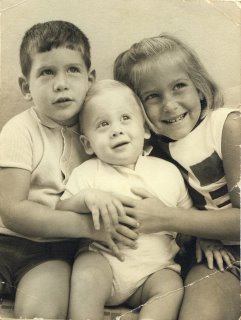Erich Meissner Part III: A New Home?

After Europe, Erich and Ruth continued on to the United States making stops in New York, New Orleans, and Miami. Then came Salvador; Ruth had to be introduced to the Jewish community and to a very new way of life. Those already settled in Salvador were interested in the new arrivals…..
Below you will see an excerpt from his oral history recently taken in Israel. All questions in parentheses (...) are mine.
(Did you discuss the war amongst each other?)
Seldom. We were not speaking about the war. I never told my whole story. The first thing when I came to Salvador, Max—that was the father of Ernesto and Roberto Freund—told me, “Erich, you must sit down and write down your story.” But I never did it. I started to talk a little bit. But he said, “You must sit down and write it down.”
(It was too soon?)
I didn’t write it down till today. Werner, yes. Werner wrote it down. Werner spoke into tapes.
(Did they know? Did they understand what had happened, in Salvador? Maybe they read the papers, but did they really know?)
You know, to speak about sins [?] is one thing and to live through, to go through it is another thing. But they realized it. They knew what was going on.
(When you bring Ruth to Salvador, your parents were there. Your brother was there with Perla.)
My brother was there with Perla. Then my parents were living separately and we were living separately.
(So the whole family is together.)
Yes, we were together, the whole family.
(What did Ruth say about Salvador?)
That, you must ask her. (laughs)
(Did you think that you would stay?)
Stay forever? I knew that I will not stay in Salvador forever from the beginning. For me, Salvador was a certain period. I was educated as a Zionist and I wanted to come to Israel. Of course, Ruth wanted to come back from the beginning.
(But it was a nice life. You lived there for ten years?)
It was a very nice life, a beautiful community. We have good friends there. We were a small group of young people.
(What was it like being Jewish in this place, this small country?)
In Salvador? No problem at all.
(You never had any anti-Semitism?)
No, no problem at all. Every girl in Salvador wanted to get married with a chele [light-skinned man].
(I’m sure. So you have your first child?)
Our first child was born exactly after a year.
(Tami was first, and then—)
Then was Rafi, and then was Beni. No, ’59 Tami was born, ’61 Rafi was born, and ’64 Beni was born.
(When did you decide to move back to Israel?)
I can tell you exactly. I was on a business trip when the Six-Day War started here. I was in Miami. That was my first stop. The second stop was Puerto Rico. I went from Miami to Puerto Rico to San Juan and after that I came to New York. That was during the Six-Day War here. I saw this spontaneous enthusiasm from people about winning the war. The situation was not so rosy before that. So I came back to Salvador and I told Ruth, “We are moving.”
(What did she say?)
She was just waiting for that, always wanting to come back to Israel.
(How did the children react?)
The children were small. I don’t think that there was a reaction.
(What language did you speak at home?)
With Ruth I spoke German. With the children we spoke Spanish.
(So they didn’t speak any Hebrew when they came to Israel?)
No, no. And Rafi and Tami started to speak quite Hebrew here [in Israel]. Beni was the last one. He remained with Spanish and suddenly one day he stopped to speak Spanish and started to speak Hebrew, and no words in Spanish.
(Did he forget his Spanish?)
I don’t know if he forgot. I imagine that he forgot his Spanish. But that was a curious thing. He was the last one who started to speak Hebrew, and suddenly—puck!—and that was it.
Transcription by Sandy Adler, Adler Enterprises LLC
Photo: From Meissner Family Collection. Rafi, Tami and Beni Meissner in El Salvador.


0 Comments:
Post a Comment
<< Home